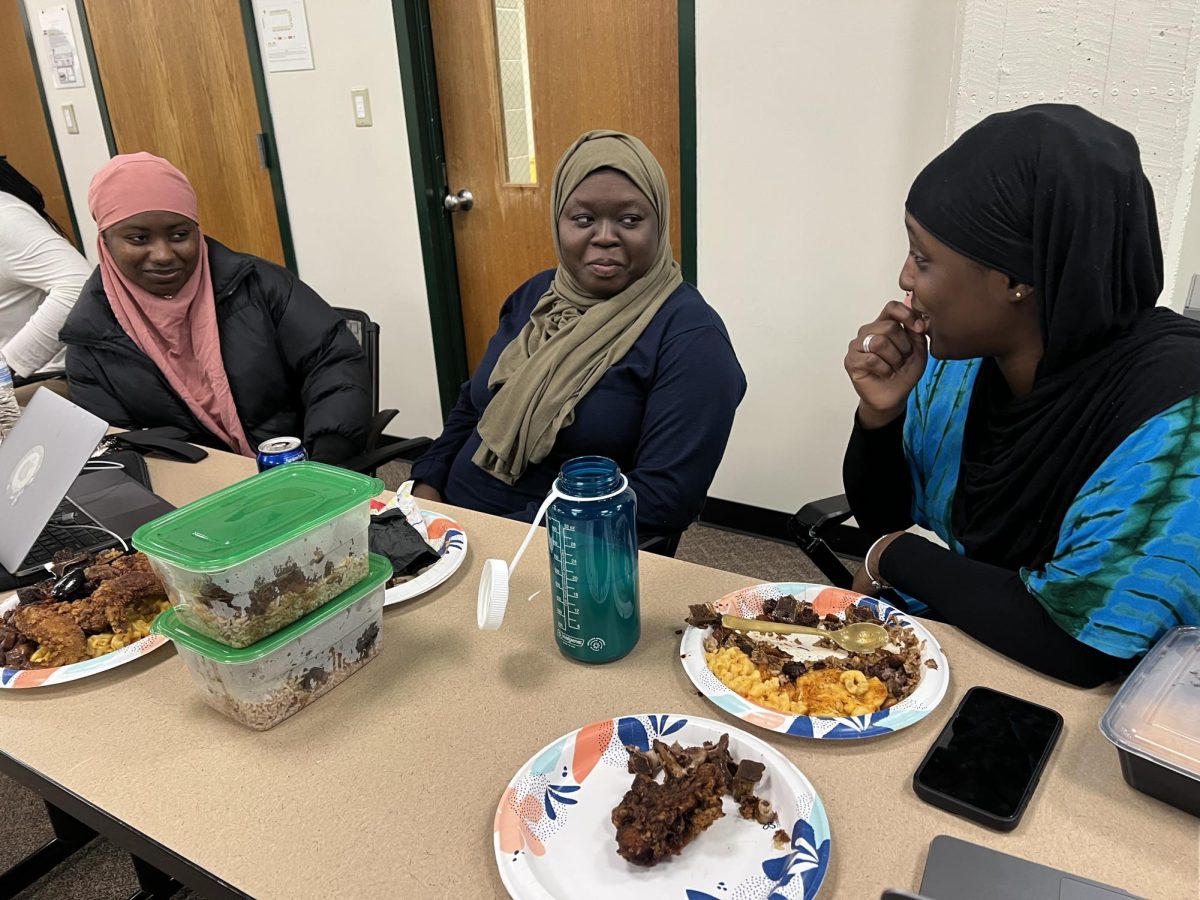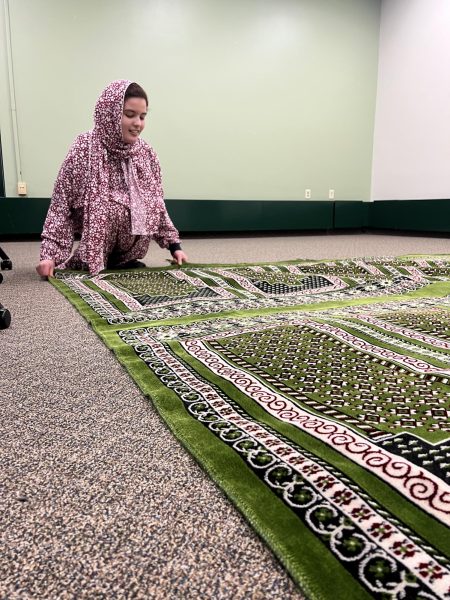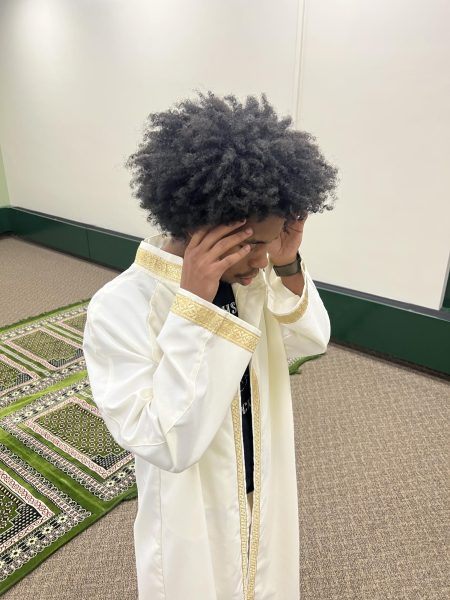
Kyle Hayes
Students enjoy food during MSA event.
Muslim students at SUNY Brockport are traversing their spiritual path during Ramadan, balancing faith, academics, and a sense of belonging on campus.
Recognizing the population of students who do celebrate Ramadan, SUNY Brockport has been working towards creating a space where students can practice their culture freely. The Muslim Student Association (MSA) has been the main advocate for these changes, ensuring that Muslim students feel welcomed and represented.
This year, the MSA hosted an event in the Seymour Union, where Muslim students can go and celebrate the holiday together. They are hosting Iftar, the fast-breaking evening meal, and Taraweeh, a prayer performed during the Islamic month of Ramadan.
Though Ramadan is an intricate holiday, the President of MSA Mohamed Musa, explains the holiday in a general way.
“Well, I could explain Ramadan by saying ‘We are just fasting by not having food or drinks from sunrise to sunset,’ but that’s a general description,” Musa said. “I’d rather describe it as ‘You gotta be doing your best this month, because it’s the holy month.”
Harrison Dining Hall, the main dining location on campus, closes at 7:30 p.m. leaving Muslim students with insufficient time to break their fast and have a proper meal before the facility shuts down. To combat this issue, the MSA decided to create this event.
Intern for the MSA, Nesrine Ramadan, says that the event provides a reliable option for students during Ramadan.
“The dining hall closes at a certain time, so that affects when students are gonna get their food,” Ramadan said. “That’s understandable, because that’s based on their time, and I’ll respect that. But I would say it can be very difficult for Muslim students to get food during Ramadan… MSA leaves our food out until 11.”

Though the dining hall has made efforts to be more inclusive in both their dining options in recent years, this does not work with every student’s availability and food restrictions.
“Seeing that the dining hall is advocating for us, giving us halal options, shows a sense of encouragement and care,” Musa said. “Like pepperoni halal options, for pizzas or quesadillas, it shows that they are putting effort in.”
Halal refers to what’s allowed under Islamic regulations, or Sharia. It’s the opposite of haram, which are prohibited things. For example, pork products and blood are haram.
“I remember last year, dining services would make to-go bags for Muslim students,” Ramadan said. “I’m not sure what they are doing this year, but it’s not as accommodating for Muslims, because we try to incorporate more halal foods. It’s something we are grateful for, but we definitely need to do more as a school.”
Some Muslims are permitted to miss fasting under certain conditions, as long as they make up the missed fasts later, which is considered an obligation.
“For example, for women, Islam could be considered easier because if we have our menstrual cycle, or if we’re pregnant, we don’t need to fast,” Ramadan said. “If anyone is sick, any gender or disability or medical condition, you don’t need to fast.”
Muslims may also be exempt from fasting for travel, postpartum bleeding, breastfeeding, extreme fatigue, or advanced age. Additionally, children who have not yet reached puberty are not obligated to fast, although some may choose to participate voluntarily.
Musa’s commitment to fasting during Ramadan has deepened over the years. Even when illness exempted him from fasting, he felt motivated to continue the practice.
“I’m participating in Ramadan this year because it’s kinda a connection for me,” Musa said. “I was born in Saudi Arabia, where Islam came from, so it’s more of a tradition. Fun fact, I’ve been fasting every Ramadan since I was like 10 or 11, so I’ve kinda grown into it.”
Though Musa and Ramadan now have a safe location to celebrate their Islamic culture, it didn’t always feel that way.
“I will say in my own Islamic journey, I felt like an outsider,” Ramadan said. “When I came to Brockport, it felt like I didn’t fit in, even though I did have friends; I just didn’t fit in based on my culture itself. It’s really hard when you’re embracing your culture in a more Eurocentric world. But when I came across MSA, that’s when I started seeing people who had similar experiences as mine.”

Brockport’s student population is 69.99% White, yet despite the lack of a direct connection between race and religion, the MSA is predominantly made up of people of color.
“A lot of us are Afrocentric or Latino Muslims, so we’re not just one subgroup of a minority, we’re multiple,” Ramadan said. “Especially in the Western world, Muslims are seen as a minority community. So, we are still trying to spread that awareness, especially at a predominantly white institution; it’s a little difficult, but that doesn’t stop us.”
This demographic diversity not only reflects the cultural backgrounds within the Muslim community but also highlights the inclusive space MSA provides on campus.
“I think we need to be more protected and have the higher-ups understand who we are,” Ramadan said. “I hope that they could come to more of our events and understand what we represent. Having more support will make us feel safer, more protected, and keep our safe space. Because honestly, our safe space is us just talking about our personal experience and not being attacked because of it.”
Both Ramadan and Musa agree that there could be more done by Brockport to increase on-campus inclusion.
“Something Brockport could do is promote holiday events,” Musa said. “We see Halloween being promoted, but I think it would be better if they promoted all other holidays. Not just Islam, but all holidays to give the students a sense of community. Even for students outside of that religion or culture, just to inform people that certain stuff may be going on and to be more empathetic.”
Though underrepresented on campus, the MSA is working to raise awareness, especially through their events. The MSA also aims to share its culture campus-wide, challenging any stereotypes and misconceptions about Muslims.
“There are challenges, especially what’s going on politically, with humanity,” Ramadan said. “People have their stigma of what Muslims are, but their perceptions are far from what it actually is. So, when we do events, we let people know what we represent, and that’s peace and love.”
Despite the challenges Muslim students and the Muslim Student Association (MSA) have faced, they continue to advocate for their place on campus while balancing their academics and staying true to their faith.